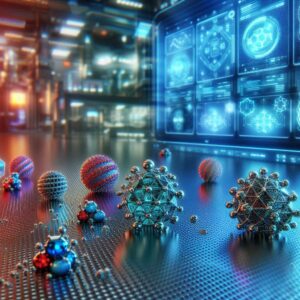In the realm of scientific advancements, nanotechnology stands out as a groundbreaking field with the potential to revolutionize various industries. From healthcare and electronics to environmental protection, nanotechnology harnesses the power of manipulating matter at the atomic and molecular levels. In this article, we will explore the fascinating world of nanotechnology, its applications, and the profound impact it has on our lives.

What is Nanotechnology?
Nanotechnology involves the manipulation of materials at a nanoscale, typically between 1 and 100 nanometers. To put it into perspective, a nanometer is one-billionth of a meter. At this scale, materials exhibit unique properties that differ significantly from their bulk counterparts. These properties include increased strength, enhanced chemical reactivity, and improved electrical conductivity.
Applications of Nanotechnology
Healthcare
Nanotechnology has made significant strides in the medical field, leading to innovations in drug delivery, diagnostic tools, and therapeutic techniques. Nanoparticles can be engineered to deliver drugs directly to targeted cells, minimizing side effects and improving treatment efficacy. Additionally, nanoscale sensors can detect diseases at an early stage, allowing for timely intervention.
Electronics
The electronics industry has greatly benefited from nanotechnology, enabling the development of smaller, faster, and more efficient devices. Nanoscale transistors and quantum dots are paving the way for advancements in computing, data storage, and display technologies. These innovations are driving the miniaturization of electronic components, leading to more powerful and portable gadgets.
Environmental Protection
Nanotechnology offers promising solutions for environmental challenges. Nanomaterials can be used to create efficient water filtration systems that remove contaminants at a molecular level. Additionally, nanotechnology-based sensors can monitor environmental conditions in real-time, helping to detect pollutants and ensure air and water quality.
Energy
In the quest for sustainable energy, nanotechnology plays a crucial role. Nanomaterials are being used to develop more efficient solar cells, batteries, and fuel cells. These innovations have the potential to enhance energy storage and conversion, reducing our reliance on fossil fuels and promoting a greener future.
The Future of Nanotechnology
As research and development in nanotechnology continue to advance, the possibilities for new applications are virtually limitless. Future innovations may include nanoscale robots for medical procedures, advanced materials with unprecedented properties, and even the development of quantum computing technologies.
Conclusion
Nanotechnology is a transformative field that holds immense potential to address some of the world’s most pressing challenges. From revolutionizing healthcare and electronics to promoting environmental sustainability and energy efficiency, the impact of nanotechnology is far-reaching. As we continue to explore the possibilities of this remarkable technology, we can look forward to a future where tiny innovations lead to big impacts.
